Science fiction comedy or comic science fiction is a subgenre of science fiction or science fantasy that exploits the science fiction genre's conventions for comedic effect. Comic science fiction often mocks or satirizes standard science fiction conventions, concepts and tropes – such as alien invasion of Earth, interstellar travel, or futuristic technology. It can also satirize and criticize present-day society.

Crime fiction, detective story, murder mystery, mystery novel, and police novel are terms used to describe narratives that centre on criminal acts and especially on the investigation, either by an amateur or a professional detective, of a crime, often a murder. It is usually distinguished from mainstream fiction and other genres such as historical fiction or science fiction, but the boundaries are indistinct. Crime fiction has several subgenres, including detective fiction, courtroom drama, hard-boiled fiction, and legal thrillers. Most crime drama focuses on crime investigation and does not feature the courtroom. Suspense and mystery are key elements that are nearly ubiquitous to the genre.

Speculative fiction is an umbrella genre of fiction that encompasses all the subgenres that depart from realism, or strictly imitating everyday reality, instead presenting fantastical, supernatural, futuristic, or other imaginative realms. This catch-all genre includes, but is not limited to, science fiction, fantasy, horror, slipstream, magical realism, superhero fiction, alternate history, utopia and dystopia, fairy tales, steampunk, cyberpunk, weird fiction, and some apocalyptic and post-apocalyptic fiction. The term has been used for works of literature, film, television, drama, video games, radio, and their hybrids.

Gene Rodman Wolfe was an American science fiction and fantasy writer. He was noted for his dense, allusive prose as well as the strong influence of his Catholic faith. He was a prolific short story writer and novelist, and won many literary awards. Wolfe has been called "the Melville of science fiction", and was honored as a Grand Master by the Science Fiction and Fantasy Writers of America.

Maurice Gough Gee is a New Zealand novelist. He is one of New Zealand's most distinguished and prolific authors, having written over thirty novels for adults and children, and has won numerous awards both in New Zealand and overseas, including multiple top prizes at the New Zealand Book Awards, the James Tait Black Memorial Prize in the UK, the Katherine Mansfield Menton Fellowship, the Robert Burns Fellowship and a Prime Minister's Award for Literary Achievement. In 2003 he was recognised as one of New Zealand's greatest living artists across all disciplines by the Arts Foundation of New Zealand, which presented him with an Icon Award.

Sam Youd was a British writer best known for science fiction written under the name of John Christopher, including the novels The Death of Grass, The Possessors, and the young-adult novel series The Tripods. He won the Guardian Children's Fiction Prize in 1971 and the Deutscher Jugendliteraturpreis in 1976.

Genre fiction, also known as formula fiction or popular fiction, is a term used in the book-trade for fictional works written with the intent of fitting into a specific literary genre in order to appeal to readers and fans already familiar with that genre.
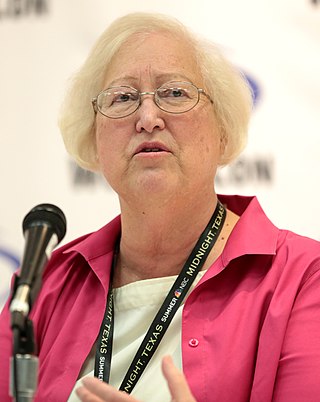
Constance Elaine Trimmer Willis, commonly known as Connie Willis, is an American science fiction and fantasy writer. She has won eleven Hugo Awards and seven Nebula Awards for particular works—more major SF awards than any other writer—most recently the "Best Novel" Hugo and Nebula Awards for Blackout/All Clear (2010). She was inducted by the Science Fiction Hall of Fame in 2009 and the Science Fiction Writers of America named her its 28th SFWA Grand Master in 2011.
Publication of comic strips and comic books focusing on science fiction became increasingly common during the early 1930s in newspapers published in the United States. They have since spread to many countries around the world.
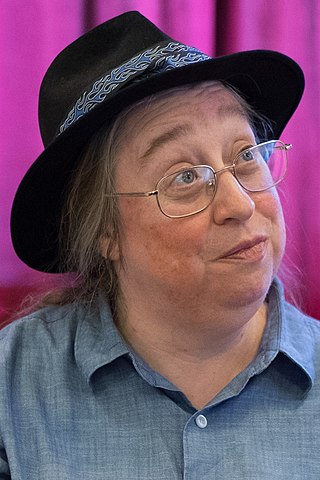
Jo Walton is a Welsh-Canadian fantasy and science fiction writer and poet. She is best known for the fantasy novel Among Others, which won the Hugo and Nebula Awards in 2012, and Tooth and Claw, a Victorian-era novel with dragons which won the World Fantasy Award in 2004. Other works by Walton include the Small Change series, in which she blends alternate history with the cozy mystery genre, comprising Farthing, Ha'penny and Half a Crown. Her fantasy novel Lifelode won the 2010 Mythopoeic Award, and her alternate history My Real Children received the 2015 Tiptree Award.

David Rowland Langford is a British author, editor, and critic, largely active within the science fiction field. He publishes the science-fiction fanzine and newsletter Ansible and holds the all-time record for most Hugo Awards, with a total of 29 wins.
The New Weird is a literary genre that emerged in the 1990s through early 2000s with characteristics of weird fiction and other speculative fiction subgenres. M. John Harrison is credited with creating the term "New Weird" in the introduction to The Tain in 2002. The writers involved are mostly novelists who are considered to be part of the horror or speculative fiction genres but who often cross genre boundaries. Notable authors include K. J. Bishop, Paul Di Filippo, M. John Harrison, Jeffrey Ford, Storm Constantine, China Miéville, Alastair Reynolds, Justina Robson, Steph Swainston, Mary Gentle, Michael Cisco, Jeff VanderMeer and Conrad Williams.
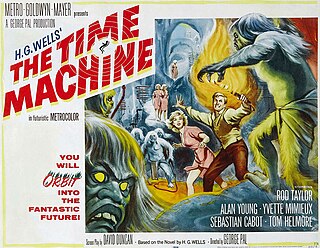
Time travel is a common theme in fiction, mainly since the late 19th century, and has been depicted in a variety of media, such as literature, television, film, and advertisements.
Worldbuilding is the process of constructing an imaginary world or setting, sometimes associated with a fictional universe. Developing the world with coherent qualities such as a history, geography, culture and ecology is a key task for many science fiction or fantasy writers. Worldbuilding often involves the creation of geography, a backstory, flora, fauna, inhabitants, technology and often if writing speculative fiction, different peoples. This may include social customs as well as invented languages for the world.
A sense of wonder is an intellectual and emotional state frequently invoked in discussions of science and biology, higher consciousness, science fiction, and philosophy.
Michael Raymond Donald Ashley is a British bibliographer, author and editor of science fiction, mystery, and fantasy.
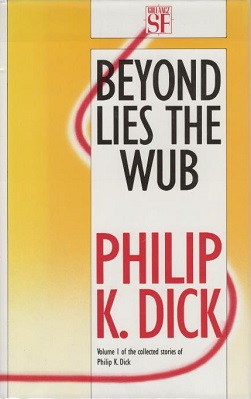
Beyond Lies the Wub is a collection of science fiction stories by American writer Philip K. Dick. It was first published by Gollancz in 1988 and later comprised Volume I of The Collected Stories of Philip K. Dick. Many of the stories had originally appeared in the magazines Fantasy and Science Fiction, Planet Stories, If, Galaxy Science Fiction, Imagination, Space Science Fiction, Fantastic Story Magazine, Amazing Stories, Future, Cosmos, Fantasy Fiction, Beyond Fantasy Fiction, Thrilling Wonder Stories, Startling Stories. The collection was reprinted by Citadel Press in 2003 under the title Paycheck and Other Classic Stories.

The Short Happy Life of the Brown Oxford is a collection of science fiction stories by American writer Philip K. Dick. It was first published by Citadel Twilight in 1990 and reprints Volume I of The Collected Stories of Philip K. Dick. Many of the stories had originally appeared in the magazines Fantasy and Science Fiction, Planet Stories, If, Galaxy Science Fiction, Imagination, Space Science Fiction, Fantastic Story Magazine, Amazing Stories, Future, Cosmos, Fantasy Fiction, Beyond Fantasy Fiction, Thrilling Wonder Stories and Startling Stories. The collection was reprinted by Citadel Press in 2003 under the title Paycheck and Other Classic Stories.
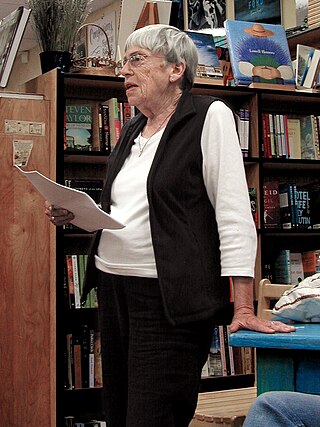
Soft science fiction, or soft SF, is a category of science fiction with two different definitions, in contrast to hard science fiction. It explores the "soft" sciences, as opposed to explores the "hard" sciences. It can also refer to which prioritizes human emotions over the scientific accuracy or plausibility.
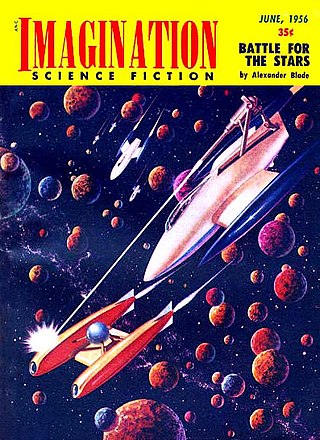
Space opera is a subgenre of science fiction that emphasizes space warfare, with use of melodramatic, risk-taking space adventures, relationships, and chivalric romance. Set mainly or entirely in outer space, it features technological and social advancements in faster-than-light travel, futuristic weapons, and sophisticated technology, on a backdrop of galactic empires and interstellar wars with fictional aliens, often in fictional galaxies. The term does not refer to opera music, but instead originally referred to the melodrama, scope, and formulaicness of operas, much as used in "horse opera", a 1930s phrase for a clichéd and formulaic Western film, and "soap opera", a melodramatic television series. Space operas emerged in the 1930s and continue to be produced in literature, film, comics, television, video games and board games.














